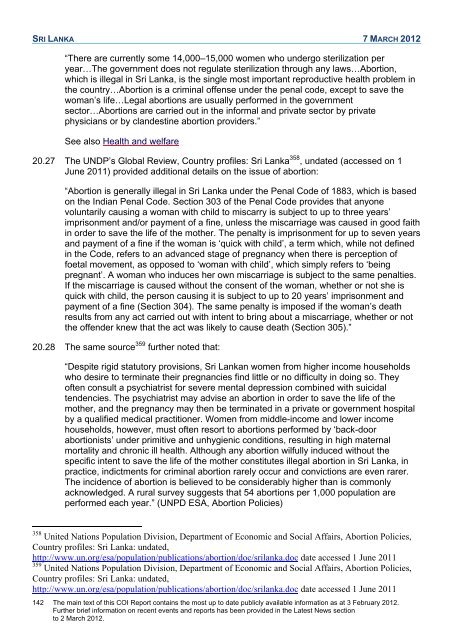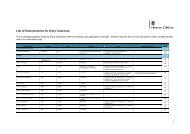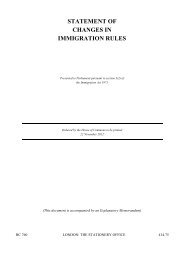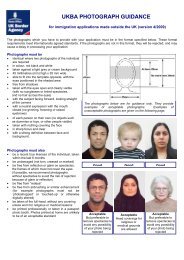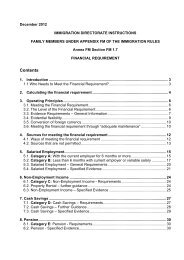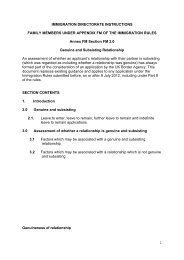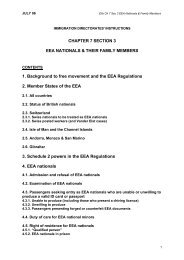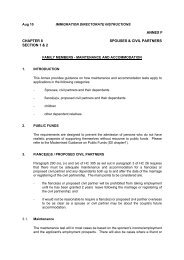COI Report March 2012 - UK Border Agency - Home Office
COI Report March 2012 - UK Border Agency - Home Office
COI Report March 2012 - UK Border Agency - Home Office
You also want an ePaper? Increase the reach of your titles
YUMPU automatically turns print PDFs into web optimized ePapers that Google loves.
SRI LANKA 7 MARCH <strong>2012</strong><br />
―There are currently some 14,000–15,000 women who undergo sterilization per<br />
year…The government does not regulate sterilization through any laws…Abortion,<br />
which is illegal in Sri Lanka, is the single most important reproductive health problem in<br />
the country…Abortion is a criminal offense under the penal code, except to save the<br />
woman‘s life…Legal abortions are usually performed in the government<br />
sector…Abortions are carried out in the informal and private sector by private<br />
physicians or by clandestine abortion providers.‖<br />
See also Health and welfare<br />
20.27 The UNDP‘s Global Review, Country profiles: Sri Lanka 358 , undated (accessed on 1<br />
June 2011) provided additional details on the issue of abortion:<br />
―Abortion is generally illegal in Sri Lanka under the Penal Code of 1883, which is based<br />
on the Indian Penal Code. Section 303 of the Penal Code provides that anyone<br />
voluntarily causing a woman with child to miscarry is subject to up to three years‘<br />
imprisonment and/or payment of a fine, unless the miscarriage was caused in good faith<br />
in order to save the life of the mother. The penalty is imprisonment for up to seven years<br />
and payment of a fine if the woman is ‗quick with child‘, a term which, while not defined<br />
in the Code, refers to an advanced stage of pregnancy when there is perception of<br />
foetal movement, as opposed to ‗woman with child‘, which simply refers to ‗being<br />
pregnant‘. A woman who induces her own miscarriage is subject to the same penalties.<br />
If the miscarriage is caused without the consent of the woman, whether or not she is<br />
quick with child, the person causing it is subject to up to 20 years‘ imprisonment and<br />
payment of a fine (Section 304). The same penalty is imposed if the woman‘s death<br />
results from any act carried out with intent to bring about a miscarriage, whether or not<br />
the offender knew that the act was likely to cause death (Section 305).‖<br />
20.28 The same source 359 further noted that:<br />
―Despite rigid statutory provisions, Sri Lankan women from higher income households<br />
who desire to terminate their pregnancies find little or no difficulty in doing so. They<br />
often consult a psychiatrist for severe mental depression combined with suicidal<br />
tendencies. The psychiatrist may advise an abortion in order to save the life of the<br />
mother, and the pregnancy may then be terminated in a private or government hospital<br />
by a qualified medical practitioner. Women from middle-income and lower income<br />
households, however, must often resort to abortions performed by ‗back-door<br />
abortionists‘ under primitive and unhygienic conditions, resulting in high maternal<br />
mortality and chronic ill health. Although any abortion wilfully induced without the<br />
specific intent to save the life of the mother constitutes illegal abortion in Sri Lanka, in<br />
practice, indictments for criminal abortion rarely occur and convictions are even rarer.<br />
The incidence of abortion is believed to be considerably higher than is commonly<br />
acknowledged. A rural survey suggests that 54 abortions per 1,000 population are<br />
performed each year.‖ (UNPD ESA, Abortion Policies)<br />
358<br />
United Nations Population Division, Department of Economic and Social Affairs, Abortion Policies,<br />
Country profiles: Sri Lanka: undated,<br />
http://www.un.org/esa/population/publications/abortion/doc/srilanka.doc date accessed 1 June 2011<br />
359<br />
United Nations Population Division, Department of Economic and Social Affairs, Abortion Policies,<br />
Country profiles: Sri Lanka: undated,<br />
http://www.un.org/esa/population/publications/abortion/doc/srilanka.doc date accessed 1 June 2011<br />
142 The main text of this <strong>COI</strong> <strong>Report</strong> contains the most up to date publicly available information as at 3 February <strong>2012</strong>.<br />
Further brief information on recent events and reports has been provided in the Latest News section<br />
to 2 <strong>March</strong> <strong>2012</strong>.


